Jo Marini, an eternal optimist who delights in critical inquisition of the status quo, is the Founder and CEO of Mother Superior, a venture and social purpose foundry that is redefining and redesigning venture capital. Jo was raised by an extended community of immigrants who shaped her world view of equity, opportunity and economic agency. Focused on early-stage entrepreneurs, the foundry’s novel approach to VC is designed with exponential success as a feature, and offers founders a full suite of services, operations, funding and long-term support. Founders retain majority equity and generate opportunities for others as values-based investors in future social purpose ventures.
What does “entrepreneurship” mean to you?
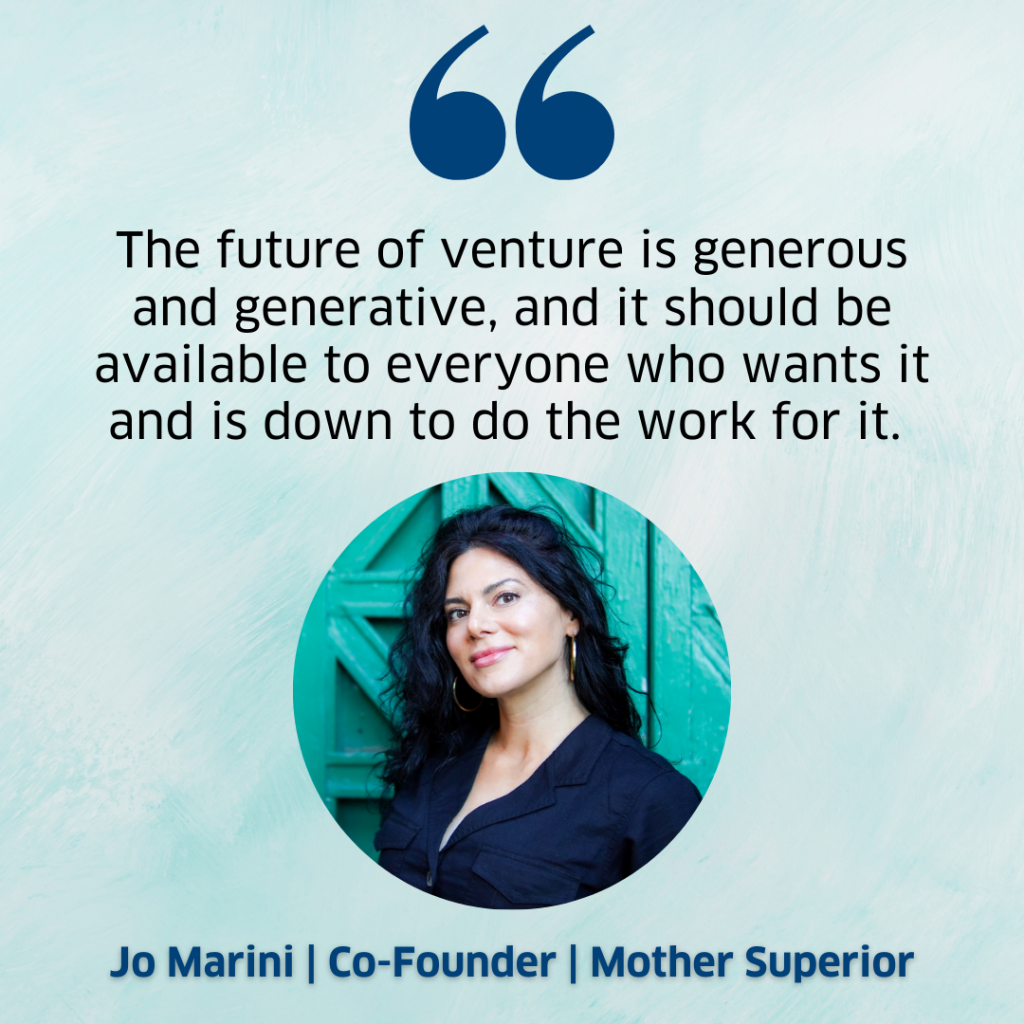 Jo Marini: Entrepreneurship is sparked when someone doesn’t see themselves reflected in the way that they experience the world, and is then inspired and committed to create a purposeful and useful solution to fill that empty space.
Jo Marini: Entrepreneurship is sparked when someone doesn’t see themselves reflected in the way that they experience the world, and is then inspired and committed to create a purposeful and useful solution to fill that empty space.
At Mother Superior, we work with Everyday Founders who are not reflected in the nearly 99% of people receiving capital. They have a perspective into product and service gaps that are extremely valuable, and are brave enough to bet on themselves to design solutions that fuel profitable, purposeful and resilient ventures.
How did your company come to be?
JM: My a-ha moment in creating Mother Superior happened when I heard an established venture capitalist describe the current VC model. At that moment, I could clearly see the huge gap between the reality of those with access to the insider world of VC and the reality that everyone else was living in. People like my family and I were not included in this world. Women, immigrants, people of color, those with disabilities are excluded from those opportunities and, ultimately, from building the wealth and power that comes from those opportunities. Mother Superior was designed to support the success of Everyday Founders as the central thesis of the business.
How has your business changed in response to the COVID-19 pandemic?
JM: After nearly two years of groundwork, Mother Superior was preparing to raise a meaningful round of funding in March 2020. The global onset of COVID caused the world to take a collective pause, and we followed suit. Instead of pushing through with the planned raise, we spent time observing what was happening and the incalculable toll of the pandemic on people’s lives and livelihoods. This pushed us into an accelerated, deeper understanding of the underlying systems and structures that created – and widened – the socioeconomic divide in the U.S. My team got very clear on the true purpose of our work and emerged with a fundamental redesign of funding models for profitable, purposeful and equitable ventures. The future of venture is generous and generative, and it should be available to everyone who wants it and is down to do the work for it. We have since resumed our raise, shaped by these insights and aligned with our vision.
What is your proudest and darkest moment so far? Share a key high and a key low from your journey if you can.
JM: My proudest moment was the first time that the concept of Mother Superior was pitched to a potential collaborator and investor – and they understood the pitch and were inspired by the mission. Being so deep in the work means that it can be easy to get lost in the details. Our ability to quickly talk about our complicated work in a way that is direct, engaging and inspiring is truly a point of pride.
My darkest moment was when the partner of Mother Superior’s co-founder suddenly passed away, very early in our formation. He was also a dear friend, a collaborator, an enthusiastic supporter and an integral part in helping to build our first financial models. There was no question of continuing on, but incalculable loss is followed by time for healing. The first year was a hard one and a lonely one, focused on building one step at a time, grounded in the work to be done.
How is your company changing the landscape?
JM: Mother Superior is changing the landscape by redefining venture through redefining founders. This ground up redesign focused first on who was included and excluded from venture opportunities, then reimagined a world where systems and structures existed to support their success and scale.
My team is also brilliantly working to democratize the tools and resources that we have created to support Everyday Founders that fall outside of our direct ecosystem. For example, we reimagined the term sheet, to include not only options for regenerative models of investment and return that maximize profit, but also mission-locked and exponential social purpose measures in the form of a Common Good Agreement, Code of Conduct and measurable and reportable criteria that businesses can incorporate at the foundational operating level in ways that make sense for themselves, their stakeholders and communities.
What do you wish you knew when you started? Is there anything you would do differently?
JM: No startup journey is easy, and each comes with its unique challenges. In my case, the starting point was realizing that an antiquated system was being used as the foundation for VCs to show up for modern and diverse founder needs. We had at least ten thousand questions and zero answers.
It took a lot of time, research, and patience to embrace a progressive understanding of systemic causes of venture inequity. At Mother Superior we aren’t giving the most money or funding the most businesses, but instead have an outsized impact in helping progress venture toward more equitable, inclusive, and generative models.
I’m confident that where we are today comes from the time and consideration that went into building the company. Despite the challenges, there’s not anything (I can think of!) that could have been done differently that would have resulted in such a positive outcome.
What advice/credo do you live by as you grow the business / what is your professional and personal mission statement?
JM: My personal and professional mission statement is “Raise together, rise together.” Everything that happens at Mother Superior, happens with consideration of the influence and exponential impact on the human and ecological factors in the system.
Where do you find inspiration when faced with challenges?
JM: I have made peace with knowing that the work I find worthy to spend my life in pursuit of will always be simultaneously purposeful and challenging.
Systemic change toward social purpose takes patience. It takes radical empathy. And it takes steadfast resolve in working through big, complicated problems. But the struggles and sticky spots are often most illuminating – they show where we need to go.
Understanding that the challenge is also the path is helpful when these moments arise. I’m inspired by my team, our Everyday Founders, and the incredible network of collaborators and supporters that we have organically partnered with in the last few years. Together, we seek to understand the challenges at hand through new perspectives and collaborate toward solutions.
What does “success” look like for you? What do you think will help you achieve it?
JM: When I see Everyday Founders like our Minerva Minded team figure out some really nuanced engineering and show up with their plan for a truly disruptive cradle-to cradle consumer electronics divide that not only solves a major user issue but also a plan to engage and produce domestically AND share equity with those who have been displaced in the workforce? Bullseye.
This type of brilliance and potential for network success is everywhere – not just out of top MBA schools and in Silicon Valley. We’ll be successful when we see the VC community start really understanding this – and not just in creating more diversity funds, but by also taking our lead and adopting regenerative models of investment and return that create meaningful equity across the whole founder ecosystem.
At the end of the day, success is a business that is profitable and radically purposeful. Our Everyday Founders have already pushed our initial concepts of success beyond what we could have ever imagined on our own – imagine what we’ll discover five years from now?
What’s it like to work alone or with your partners? What advice do you have for fellow entrepreneurs about building and leading teams?
JM: A domestic partnership and a business partnership require the same skills (and it’s a lot easier to exit a domestic partnership than a business one). It is the most critical decision that you will make, and every other decision is dependent on this one. There’s so much that you don’t know that you don’t know when you get started. In lieu of having the ability to navigate and evaluate in well-defined visions, take time to understand if your strengths are diversified and your working styles, values and long-term goals are compatible and aligned. Do you like your potential partners? Do you trust them? You’ll be spending a lot of time together. You may not always agree but if you like and trust them, it makes it easier to work through different viewpoints and hard decisions.
When you’re leading a team, never forget that every person on that team is your best asset. At Mother Superior, we operate with full transparency. Every employee has equity in their voice and equity in the company. While our teams do specialize, everyone sees what is happening across the full ecosystem and participates in high-level strategic work. Some of our most interesting inspirations have come from brilliant people with divergent perspectives.
Many entrepreneurs continue to perfect their daily routines to support their work and greater vision; would you mind sharing your morning routine or a regular ritual that grounds your work each day? How has it changed in recent months?
JM: I need to be honest – I don’t understand the obsession with structured morning routines or believe that more obscure wellness steps equal heightened enlightenment. I am also convinced that 90% of them are made up, because how many times can you read about someone drinking hot lemon water and journaling before sunrise?
While I do live by the motto, “If it’s not on my calendar, it’s not real,” I believe there is no perfect routine – you have to do what works for you. For me, each day is different, and my lack of a structured routine helps me move through the day in a more flexible way without distraction or guilt. Think about it – if you take the same route home every day, you only ever see what’s happening on that one path. Break out from your routine for a moment and see how it goes – you might find something useful in the newness.
What keeps you motivated during this time?
JM: Have you ever learned something that fundamentally shaped the way that you see the world, in such a way that you just can’t unknow it? And because of that knowing, it becomes part of who you are and everything that you do? This is what this work is for me.
In the last year, I have seen the brokenness of so many of our institutions. That understanding of the human cost of our economic and social divides in this nation is what drives me. Seeing what is and understanding that I have the capabilities and resources to effect change towards an equitable future makes me hopeful.
This work is part of me now, and I’m not sure that I could do anything else – there is no plan B. My motivation is to live my values and work toward that hopeful future with my team and alongside Everyday Founders.
What kind of an entrepreneur do you want to be known as, as in, what do you want your legacy to be?
JM: The infrastructure exists with well-established pathways for tech giants, and those who hope to emulate them, to succeed at scale. But these systems and structures don’t work for the rest of us – nearly 99% of Americans that find themselves outside the margins of opportunities to access the same inroads for support toward self-built wealth and economic agency.
I hope my legacy is one known for my work in using the opportunities given to and earned myself to create new pathways that allow the rest of us the opportunity to create our own success, wealth, power, and legacy at scale.
Have you experienced mentorship in your career? Do you feel it was easily available to you?
JM: I have cultivated an organic, expansive, and unstructured network of wildly skilled mentors from all ages and life stages. My career path has been a journey back and forth between the spaces of creating for others and creating for myself – embracing flexibility, showing up, being curious and asking questions has attracted these wise, seasoned and engaged advisors and confidants that I am grateful to be constantly learning from and inspired by.
Who are the people who have mentored or influenced you in your life or career? How has their influence changed the trajectory of your entrepreneurial journey?
JM: The biggest influencer in my career is Geri Johnson, current Chief Operating Officer at Next PR. She has been a dear friend and mentor for many years. In my 20’s and early 30’s, I felt like I was always running out of time. I rushed my work, and the work of those on my team, to meet self-imposed expectations of what I thought I needed to accomplish to be successful. In reality, it was compromising my potential for leadership, personal growth and impact.
Geri taught me to slow down with intention. She taught me that change takes time, and how to understand and plan for the long-term impact of my work. In a startup culture that prizes speed and scale, this perspective has given Mother Superior a competitive advantage around designing for sustained, systemic change. I look at Mother Superior in increments of 10 years as opposed to getting out in the world and funding as many companies as possible right away. I still waste no time – but that now means that my cadence is balanced with vision and purpose, and at a pace that works for all stakeholders to create dimensional, meaningful, and enduring impact.
Do you have someone you’d like to nominate to be profiled in our Faces of Entrepreneurship series? Please let us know by emailing media@thecenter.nasdaq.org.
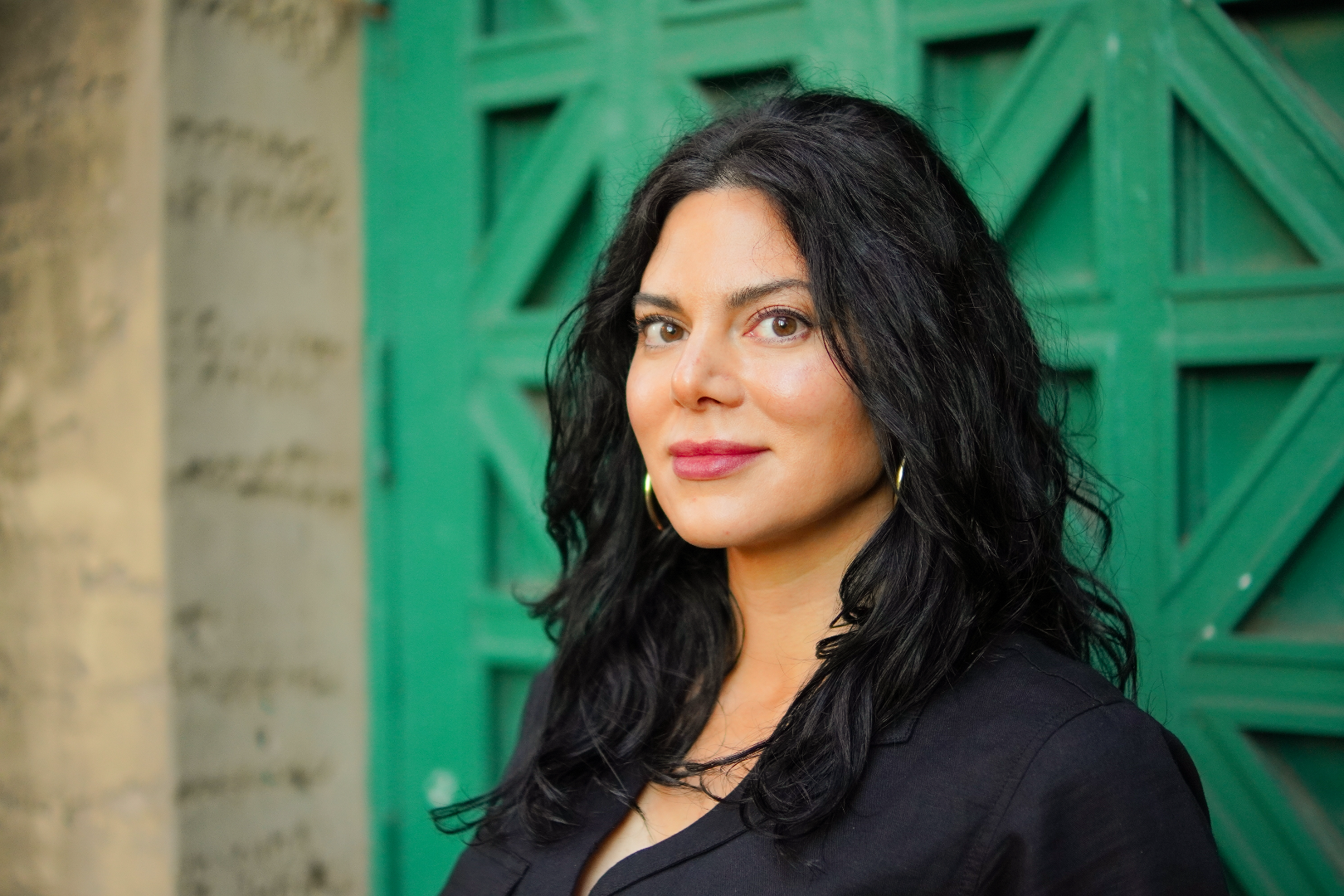
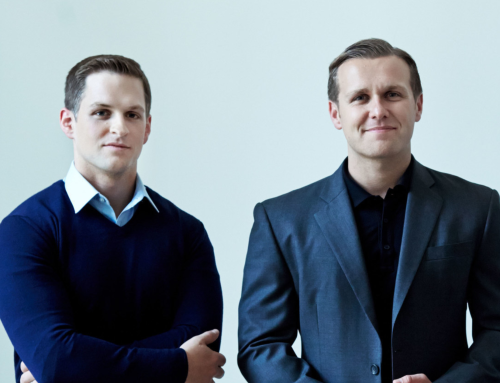
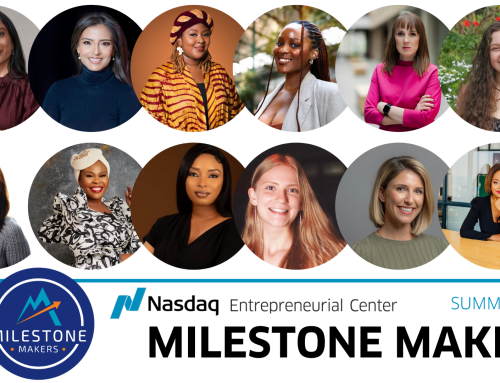
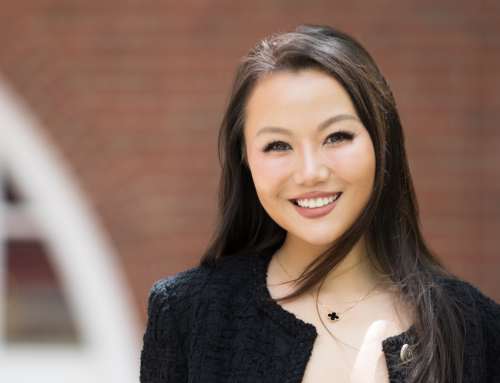
Invite a Friend
Close